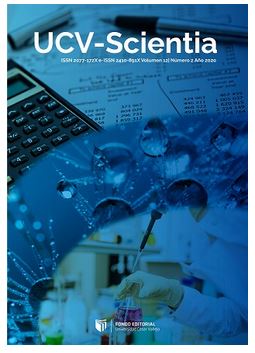Apoyo social percibido y la triada luminosa de la personalidad en trabajadores humanitarios
DOI:
https://doi.org/10.18050/revucv-scientia.v15n2a2Palabras clave:
apoyo social, triada luminosa, trabajadores humanitarios, apoyo materialResumen
Introducción: Los trabajadores humanitarios se ven afectados por circunstancias en las que son puestas a prueba su empatía y altruismo, en el cual el apoyo puede ser una variable para considerar. Objetivo: Establecer la relación entre el apoyo social percibido y la triada luminosa de la personalidad en trabajadores humanitarios. Método: Se evaluó a 123 personas, dentro de las cuales podemos encontrar a profesionales de diversas especialidades, de los cuales fueron 101 mujeres y 22 varones a quienes se les aplicó el Cuestionario de Apoyo Social Percibido (MOS) y la Escala de la tríada luminosa de la personalidad. Resultado: Se halló la correlación entre las variables apoyo social percibido y la tríada luminosa de la personalidad, a excepción de la dimensión apoyo material que obtuvo un coeficiente de ,105 y sig. de 0.246.
Referencias
Aldamman, K., Tamrakar, T., Dinesen, C., Wiedemann, N., Murphy, J., Hansen, M., Elsiddig Badr, E., Reid, T., & Vallières, F. (2019). Caring for the mental health of humanitarian volunteers in traumatic contexts: the importance of organisational support. European Journal of Psychotraumatology, 10(1), 1694811. https://doi.org/10.1080/20008198.2019.1694811
Andrade, G. & Vaitsman, J. (2002). Apoio social e redes: conectando solidariedade e saúde. Ciênc Saúde Coletiva, 7(4): 925-34. https://doi.org/10.1590/S1413-81232002000400023
Ato, M., López, J. y Benavente, A. (2013). Un sistema de clasificación de los diseños de investigación en psicología. Anales de psicología, 29(3), 1038-1059. https://dx.doi.org/10.6018/analesps.29.3.178511
Casallo, V. (2017). Estética e ideología: Perspectivas comunicacionales. Conexión, 6(8), 95-108. https://doi.org/10.18800/conexion.201702.006
Clark, M. A., Springmann, M., Hill, J., & Tilman, D. (2019). Multiple health and environmental impacts of foods. Proceedings of the National Academy of Sciences, 116(46), 23357-23362. https://doi.org/10.1073/pnas.1906908116
Cohen, S. (2004). Social Relationships and Health. American Psychologist, 59(8), 676 –684. https://doi.org/10.1037/0003-066X.59.8.676
De Fouchier C, Kedia M. (2018). Trauma-related mental health problems and effectiveness of a stress management group in national humanitarian workers in the Central African Republic. European Journal of Psychotraumatology.;16(2):103–9. http://dx.doi.org/10.3402/ejpt.v6.28541
Gardemann, J., & Wilp, T. (2016). The Humanitarian Charter and minimum standards in humanitarian response are applicable in German refugee facilities. Bundesgesundheitsblatt-Gesundheitsforschung-Gesundheitsschutz, 59, 556-560. https://doi.org/10.1007/s00103-016-2330-y
Gutierrez, E.L.M. (2019) Participation in Tourism: Cases on Community-Based Tourism (CBT) in the Philippines. Ritsumeikan Journal of Asia Pacific Studies, 37, 23- 36. https://www.scirp.org/reference/referencespapers?referenceid=3111370
Hernández, L. E., & Acosta, R. M. (2022). Apoyo Social Percibido y Tríada Oscura de la Personalidad en Estudiantes y Profesionales de la Salud. Revista de Investigación en Psicología, 25(1), 117–134. https://doi.org/10.15381/rinvp.v25i1.22408
Jachens, L., Houdmont, J., & Thomas, R. (2016). Effort–reward imbalance and heavy alcohol consumption among humanitarian aid workers. Journal of Studies on Alcohol and Drugs, 77(6), 904–913. https://doi.org/10.15288/jsad.2016.77.904
Lopes Cardozo, B., Gotway Crawford, C., Eriksson, C., Zhu, J., Sabin, M., Ager, A., Foy, D., Snider, L., Scholte, W., Kaiser, R., Olff, M., Rijnen, B., & Simon, W. (2012). Psychological distress, depression, anxiety, and burnout among international humanitarian aid workers: a longitudinal study. PloS one, 7(9), e44948. https://doi.org/10.1371/journal.pone.0044948
Lupano, M. L. y Castro, A. (2021). Rasgos de personalidad, bienestar y malestar psico-lógico en usuarios de redes sociales que presentan conductas disruptivas online. In-terdisciplinaria. Revista de Psicología y Ciencias Afines, 38(2), 7-23. https://doi.org/10.16888/interd.2021.38.2.1
Descargas
Publicado
Número
Sección
Licencia
Derechos de autor 2024 Yocelin Luque Villanueva

Esta obra está bajo una licencia internacional Creative Commons Atribución 4.0.
- Compartir — copiar y redistribuir el material en cualquier medio o formato
- Adaptar — remezclar, transformar y crear a partir del material
- El licenciador no puede revocar estas libertades mientras cumpla con los términos de la licencia.
Bajo las condiciones siguientes:
-
Reconocimiento — Debe reconocer adecuadamente la autoría, proporcionar un enlace a la licencia e indicar si se han realizado cambios<. Puede hacerlo de cualquier manera razonable, pero no de una manera que sugiera que tiene el apoyo del licenciador o lo recibe por el uso que hace.
- No hay restricciones adicionales — No puede aplicar términos legales ni medidas tecnológicas que restrinjan legalmente a otras a hacer cualquier uso permitido por la licencia.













